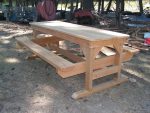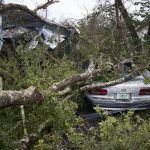




Losing everything can be devastating. As a friend, family member, or neighbor, knowing how to offer comfort and support during such a difficult time is essential. This article provides practical advice on the do’s and don’ts of comforting someone who has lost everything, drawing on the experiences of those affected by Hurricane Harvey. By following these guidelines, you can provide meaningful support and help your loved ones navigate their loss with greater resilience.

Table of contents
Everything was lost. Ruined by tainted floodwater, with no hope of salvage.
I drove by my friend’s beautiful home that Hurricane Harvey ravaged and stared at what was left, piled high outside on his front yard. It wasn’t my own personal loss. Yet, I felt very deep sorrow all the same.
I wasn’t there when a convoy of dump trucks arrived to unceremoniously load up ruined carpet, furniture, flooring, toys, and mementos and drive away, as though the remnants of the secure home that once stood there were nothing more than common trash.
Those remnants did have meaning. Every piece told a story. Now here I was, wondering what to say and how to comfort this family who lost it all.
I asked some of the victims of Harvey’s wrath what words and actions comforted them and which caused pain and distress. Here is what they told me:
The Don’ts of How to Comfort Someone
- DON’T say, “It could be worse.” In the middle of a dire loss, it’s hard to see how it could possibly get any worse.
- DON’T say, “It was just stuff.” Ultimately, that is true. Our loved ones may be safe and sound, but that pile of debris represented things both tangible and intangible. Things like security, love, and memories. And how do you replace Grandma’s hand-crocheted baby blanket, a wedding dress meant to pass on to the next generation, or a treasured collection? You can’t. It’s easy to say, “It was just stuff,” when it wasn’t your stuff!
- DON’T say, “This will make you strong.” How do you know? An event that makes one person strong may completely destroy another.
- DON’T say, “Call if you need something,” and then just walk away. When your friend has lost everything significant to her, she needs a hug and some of your time, just to chat or cry.
- DON’T say, “It’s a blessing in disguise.” Yikes! When your home and its belongings are destroyed, it may take weeks or months for your friend to be able to look beyond that loss and see a silver lining.
- DON’T say, “Did you have insurance?” or “Did you have flood insurance?” As they say, hindsight is 20/20 and you’d better believe your sweet friend is already feeling enough guilt — guilt for not increasing her insurance limits, guilt for not buying additional flood insurance, guilt that she didn’t think to prepare for something like this. Please just be there for her with comforting words, a cup of coffee, and a listening ear.
- DON’T say, “Other people have lost so much more.” Really? Does that make her loss easier to bear?
- DON’T say, “We are so blessed this didn’t happen to us!” I do love to watch for life’s many blessings and be grateful for them, but this isn’t what to say to a victim of a hurricane, fire, or some other calamity. It implies that they were cursed. You got the blessing, they got the curse. Nope. That’s not how it works. In our case when our home didn’t flood, all I could say was, “We were fortunate and so very grateful.”
- DON’T say, “You didn’t really like your flooring/couch/furniture/etc. anyway.” That may be true, but so much more was lost than that. Now the family has to cope with being homeless for a time. They now face monumental struggles with bureaucracy and finances, and may never truly recover. Right now, an ugly couch or worn carpet is the very least of their problems.
- DON’T say, “You should have…” You should have tried to salvage more. You should have tried to move everything upstairs. You should have parked your car a few blocks away. You should have bought a house in a safer neighborhood. Most moms already live under a cloud of guilt. They don’t need any more piled on. They made the best decisions they knew how to make at the time.
- DON’T make light of the situation. Some of us try to bring humor into difficult situations and often it does help, but take your cue from your friend. If she is deeply suffering, she probably won’t appreciate a clever joke or pun right now.
- DON’T say, “Well, at least you’re alive!” If the crisis is big enough, the sorrow deep enough, your friend just might be wishing she wasn’t.
- DON’T say, “I wonder how this will affect our property values now.” Could you possibly be more shallow?
So often when we feel uncomfortable, the first words out of our mouths may not be the most comforting to others. By now you may be wondering, what should I say and do for someone who has lost everything? We’ll look at that next.
The Do’s of How to Comfort Someone
- DO put your money where your mouth is. If their home is destroyed, show up in work clothes, boots, and work gloves and show your love by helping rip out carpet, move furniture, and pack boxes.
- DO offer to watch their kids while the home is being gutted and through the whole process. Children are already traumatized and emotions will be running high. Being able to work, grieve, rant and rage without the kids witnessing every moment is a blessing in itself.
- DO bring cleaning supplies, mops, buckets, brooms, face masks, bleach, and mold remover.
- DO round up other strong bodies and arrive with a complete work crew.
- DO fill ice chests with ice, cold drinks, and snacks.
- DO set up a schedule to provide dinners.
- DO give gift cards and even cash to help with immediate needs. Gift cards for Home Depot, Lowe’s, restaurants, Walmart, etc. are appreciated.
- DO say, “I’m sorry.” It’s not difficult to learn how to comfort someone.
- DO offer to run errands, go grocery shopping, or transport kids.
- DO offer a hug, a prayer, some time together over coffee, and DO spend most of the time listening.
- DO be reliable. Please don’t promise to help and then be a no-show.
- DO become an advocate for your friend. Let others know her current needs, add her name and address to local churches that are sending out work crews, meals, and supplies.
- DO offer to take a shift of supervising clean-out crews and hired workers, especially if your friend must return to work. Walking that line between being desperately needed at home so the recovery and restoration can continue and desperately needing to earn an income is a difficult one.
- DO expect your friend to be emotional and sometimes, unpredictably so. Have a few tissues on hand if or when she just needs to have a good cry.
- DO extend your home as a quiet, cool, clean refuge in the midst of her chaos. It may be for just a few hours or much longer, if that is necessary.
- DO offer to do some legwork for her, such as researching FEMA procedures, vetting restoration and construction companies, asking for referrals, and so on.
As you can see there are many ways you can comfort and help those who have experienced tragedy. But if you’d still like more ideas, we’ve got some.
Remember the Grieving Process
Grieving doesn’t only occur when we lose a loved one. It occurs in other cases of loss also, such as the loss of a home and possessions. Nor is it a linear process with a set timeframe for when it’s complete. Grief is a process that each person, even those who experience the same loss, goes through in a way unique to them. Understanding the grieving process equips you to provide better comfort and care to those experiencing loss.
Related Content
There’s one more thing you can do, though, that helps grieving people.

A Final Thought:
With a little thoughtfulness and intentionality, you can more effectively comfort and support someone who has lost everything.
What suggestions do you have for how to comfort someone?
This post was originally published on September 23, 2017.




